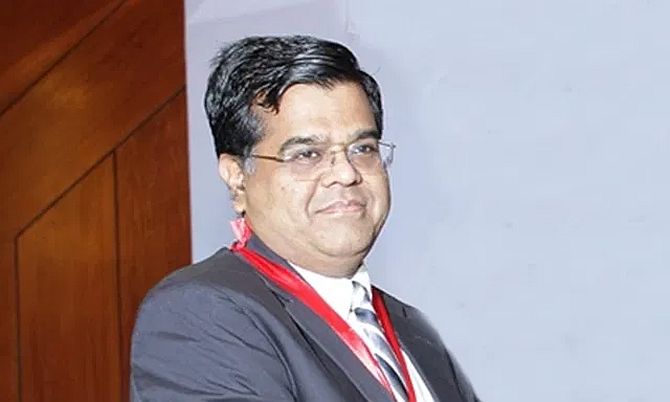


In a major bureaucratic reshuffle, Finance Secretary T V Somanathan has been named as the new Cabinet Secretary for a tenure of two years, succeeding Rajiv Gauba. The Appointments Committee of the Cabinet (ACC) approved Somanathan's appointment, along with his concurrent role as Officer on Special Duty in the Cabinet Secretariat. Meanwhile, a new Union Home Secretary is also expected to be appointed soon, as incumbent Ajay Kumar Bhalla completes his five-year tenure. Somanathan, a 1987 batch IAS officer, previously served in the Prime Minister's Office and as the Expenditure Secretary before his current appointment.
Bureaucratic Reshuffle in India: T.V. Somanathan Appointed Cabinet Secretary
The Indian government has recently announced a major bureaucratic reshuffle, which includes the appointment of T.V. Somanathan as the new Cabinet Secretary. Here's a detailed report on the reshuffle and its background:
Background
The Cabinet Secretary is the highest-ranking civil servant in India and is responsible for coordinating the work of the various ministries and departments of the government. The post has traditionally been held by an officer from the Indian Administrative Service (IAS).
The outgoing Cabinet Secretary, Rajiv Gauba, had completed his two-year tenure in the post. The government's decision to appoint T.V. Somanathan as his successor is seen as a sign of his ability and experience in handling complex policy issues.
Appointment of T.V. Somanathan
T.V. Somanathan is a 1987 batch IAS officer from the Tamil Nadu cadre. He has held several key positions in the government, including Expenditure Secretary, Secretary in the Ministry of Commerce and Industry, and Joint Secretary in the Prime Minister's Office.
Somanathan's appointment as Cabinet Secretary has been widely welcomed by the bureaucracy and the media. He is known for his intellectual acumen, problem-solving skills, and ability to work with different stakeholders.
Other Appointments
In addition to Somanathan's appointment, the government has also announced the following bureaucratic reshuffles:
FAQs
1. Who is T.V. Somanathan?
T.V. Somanathan is a 1987 batch IAS officer who has held several key positions in the government, including Expenditure Secretary, Secretary in the Ministry of Commerce and Industry, and Joint Secretary in the Prime Minister's Office.
2. Why is the appointment of T.V. Somanathan as Cabinet Secretary significant?
The appointment of T.V. Somanathan as Cabinet Secretary is significant because he is a highly respected and experienced bureaucrat who is known for his intellectual acumen, problem-solving skills, and ability to work with different stakeholders.
3. What are the key responsibilities of the Cabinet Secretary?
The Cabinet Secretary is the highest-ranking civil servant in India and is responsible for coordinating the work of the various ministries and departments of the government.
4. What are the other bureaucratic reshuffles that have been announced?
The government has also announced the appointment of Vinod Yadav as the new Union Home Secretary, A.K. Jain as the new Defence Secretary, and the retirement of Ajay Kumar Bhalla as the outgoing Union Home Secretary.
5. What is the significance of these bureaucratic reshuffles?
The bureaucratic reshuffles are significant because they indicate the government's commitment to bringing in fresh talent and expertise to key positions in the administration.

Major stock indexes trended downwards on Wednesday as earnings reports pour in and trade tensions between the US and China resurface. The Nasdaq, Dow Jones Industrial Average, and S&P 500 all ended the day in the red, with pressure from a report that the White House is considering export restrictions on China. Meanwhile, gold prices saw a slight increase and the 10-year Treasury yield ticked lower. Among corporate news, Netflix reported weaker-than-expected quarterly profit while Intuitive Surgical saw a boost in shares after exceeding expectations. DraftKings also rose upon news of their acquisition of Railbird, while Tesla and IBM prepared for their third-quarter results. Lastly, AT&T and Alphabet had mixed revenue results, causing their stocks to decline and fluctuate.

Zoho, the popular business productivity software company, is making its entry into the consumer fintech space with the launch of Zoho Pay. This standalone app will also be integrated into the company's chat platform, Arattai, allowing users to easily send and receive money while chatting with others. Zoho plans to expand their fintech offerings to include lending, broking, insurance, and wealth-tech, and sees Zoho Pay as a key component of their overall financial services ecosystem. This move also positions Arattai as a competitor to WhatsApp in the Indian market, as it experiences a surge in downloads driven by government support and privacy concerns surrounding global tech platforms.

Multinational digital tech giant Philips, known for its innovative products, lost a 20-year legal battle before the Delhi High Court. The case involved allegations of patent infringement against an Indian company in the manufacturing and sale of Video Compact Discs (VCD). The court's decision was a blow to Philips, highlighting the importance of protecting intellectual property in the business world.

Concord Control Systems, Elecon Engineering, and Welcure Drugs & Pharmaceuticals are among the companies to trade ex-date for corporate actions such as bonus issues, interim dividends, and stock splits. The ex-date is an important marker for investors, as those purchasing shares on or after this date will not be eligible for the announced benefits. Shareholders of these companies can expect to receive a bonus issue, interim dividend, and stock split in their portfolios, aiming to enhance shareholder value, reward investments, and improve stock liquidity.

Rediffusion's latest campaign for Rasna, titled "India ke Khushiyon ka Vitamin" aims to redefine the mother-child relationship in the modern world. By highlighting the brand's fruit-based drinks as a healthy and refreshing drink for kids, the campaign acknowledges the role of mothers as active partners in their child's growth and development. With a focus on Vitamin Josh and Vitamin Hasi, this new campaign highlights how Rasna is the perfect choice for today's multitasking mothers.

The Indian stock markets took a break on Wednesday in observance of Bali Pratipada, a day that holds cultural significance. The Asian markets, on the other hand, showed a mixed performance with Japan's Nikkei 225 declining, Singapore's Straits Times gaining, and Hong Kong's Hang Seng and Taiwan's Weighted Index decreasing. The previous day's Muhurat Trading session saw slight gains in Indian markets and top gainers included Cipla and Bajaj Finserv.

Investors in the Indian stock markets are getting a break from trading today with markets closed for Diwali Balipratipada. This traditional holiday marks the end of Diwali festivities and symbolizes Lord Vishnu's victory over King Bali. Trading in equity, derivatives, and commodity markets will remain suspended for the day, with normal trading resuming tomorrow. This break is a part of the exchanges' annual holiday list, aligning with important national and religious occasions.

Branded mithai sales are expected to rise by 15-20% during this Diwali season in India, due to a surge in corporate gifting, retail demand, and product innovation. The packaged sweets market in India is projected to reach 27,600 by 2033, with a 16% annual growth rate, as per IMARC Group. With a growing taste for luxury and customization in gifting, Indian brands are expanding rapidly and introducing new products, such as millet-based and vegan options, to cater to changing consumer preferences.

Shoppers Stop, India's leading retail destination, hosted a star-studded event to launch their exclusive Diwali Collection in Pune. With famous actress Tejasswi Prakash gracing the event, the store was transformed into a festive paradise with vibrant displays and a plethora of premium brands and gifting options. Speaking about the collection, Shoppers Stop's CEO Kavindra Mishra emphasized their commitment to providing the best shopping experience for customers. Fans had the opportunity to meet Tejasswi and explore the collection, making the launch a truly memorable Diwali celebration for everyone.

Muthoot Finance, India's largest gold loan NBFC, is launching the third season of its Sunheri Soch campaign, which aims to break myths surrounding gold loans and highlight the stories of its customers' success. With Madhuri Dixit as the narrator and supported by regional voices and 64 radio stations, the campaign showcases how gold loans can be an engine of opportunity and financial independence. The Sunheri Soch movement will also have a digital platform, sunherisoch.com, where customers can engage and share their own inspiring stories.